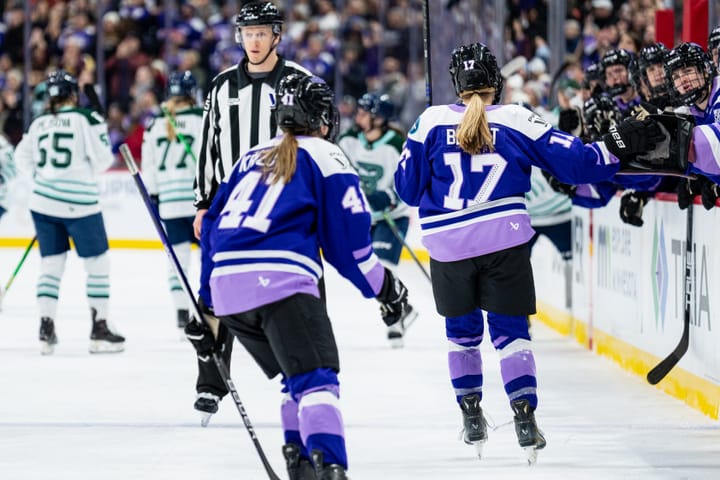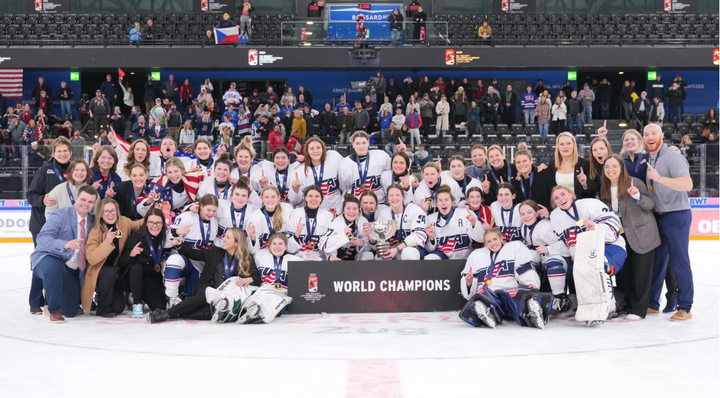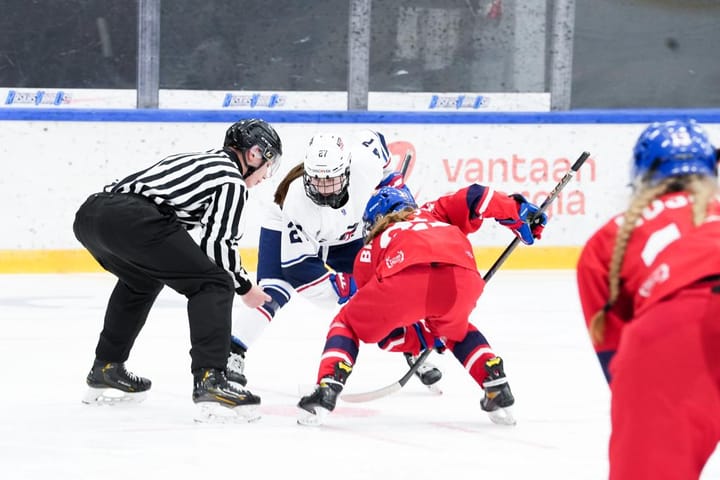Report: “Multiple” COVID cases caused Whale to pull out of Lake Placid
Orr: “We felt we had no choice.”
NWHL Commissioner Ty Tumminia said in a media conference call Wednesday evening that the Connecticut Whale exercised an opt-out option for the 2021 Lake Placid season, willingly pulling themselves out of contention.
That decision has been completely vindicated by recent health developments, as the numbers continue to climb for the Connecticut Whale and NWHL as a whole.
“We felt we had no choice,” explained Whale head coach Colton Orr. “We had a choice to play that game, and our team chose not to play. We chose the safety of our players.”
Orr explained that the Whale already had “multiple” positive COVID-19 cases prior to the Whale’s decision to cancel its Monday contest against the Minnesota Whitecaps. After choosing not to play, a decision Orr says was made “earlier that day,” the Whale received even more cases the following day.
Orr would not disclose the specific number of cases for his team, but league sources have confirmed that the number continues to climb, at this point affecting “more than half” of the team.
“The team’s concerns and decision not to play were definitely validated and confirmed by the failure to maintain a controlled environment,” Orr said. “You can see that with the Bubble being cancelled.”
A statement from the Connecticut Whale. pic.twitter.com/fAecasUP2S
— Connecticut Whale (@CTWhale_NWHL) February 3, 2021
Tumminia elaborated in her press availability that Connecticut’s decision to halt play on their season differed from the situation surrounding the Metropolitan Riveters, who were in essence forced to stop playing by the sheer number of positive cases.
With cases climbing and the health of his team and others at risk, Orr and the Whale had a difficult conversation.
“We got together as a team and wanted to hear from everyone, make sure it was a group decision …. They made the smart decision seeing as they couldn’t control the spread of what was going on. It wasn’t a choice we had the choice to make.”
“You want to play no matter what as a hockey player,” he continued. “My players stepped up and knew what the right thing was to do. I’m very proud of them to that.”
The desire to play through adversity, regardless of severity, is a staple of hockey culture. Toronto Six head coach Digit Murphy went so far as to say “We would have died if we could play the game. We would have died if we could have played against Minnesota.” In defense of her striking diction, her tone more indicated that her team was dying to play, rather than they were literally willing to sacrifice their lives mid-pandemic. But interpret how you will.
Related
Transcript: NWHL media availability on the suspension of the 2021 season
Orr was ostensibly disappointed at the abrupt end to what was a promising Whale campaign- one that had the potential to be the most successful season in franchise history. He expressed his gratitude to players for coming to the bubble prepared, explaining that his team adhered to both league guidelines and local health regulations while practicing in Danbury, Connecticut.
“We actually had no positive cases throughout the practice time,” he said. “It only started to show up when we got to Lake Placid.”
As things worsened in Lake Placid, NWHL officials did what they could to keep the ship afloat. One of those ideas, which caught both eyes and criticism, was the inclusion of a “taxi squad.” The Connecticut Whale added four players to their roster on Sunday, Jan. 31. Around the same time, Buffalo brought in defender Lisa Chesson and Minnesota signed defender Amanda Boulier.
There was rumored dissension amongst the different organizations at teams bringing in new players to this “protected environment.” With good reason: it doesn’t appear that this was an agreed-upon rule ahead of time.
“I believe that [the taxi squad] was a change in rule throughout from whoever’s setting the guidelines,” Orr mused. “That came later …. They passed protocol to get in here, that’s all I can say to that.”
So how did a team that took things so seriously get so exposed?
Previous investigation into the matter has revealed that Riveters forward Tatiana Shatalova was “unavailable” to travel with the Riveters to Lake Placid- a word that commissioner Tumminia all but confirmed on Wednesday was not-so-secret code for “COVID-positive.” It’s also worth nothing that the four teams owned by Women’s Hockey Partners (Buffalo, Connecticut, Metro and Minnesota) shared two trainers between them, hopping from bench to bench on a daily basis.
Orr declined to comment on either matter.
There have also been rumors of players breaking protocol and meandering the town of Lake Placid in their downtime, reported as recently as yesterday by The Hockey News’ Ken Campbell (though nothing definitive has been confirmed or documented). Amidst the tension, Boston’s Mary Parker reportedly opted out of the season and made her way home while the Pride played on.
While Orr specified that he could only speak to his team’s compliance with the rules set, he did mention that whether the NWHL was a “bubble” as advertised or “protective environment” as narratively retrofit, players were expected to conduct themselves with caution.
“I think [bubble] is a term. You just try to control the environment as much as possible. I don’t know how other teams did their stuff, I haven’t looked into that…we trusted our players to do the right thing. You’re an adult.”
It’s worth reiterating that Beauts head coach Pete Perram said in a press conference early in the tournament that his players stay holed up in their hotel rooms and the team conducts meetings through Zoom. Digit Murphy called coming to Lake Placid “risky” given the seriousness of their “lockdown” in Canada on Wednesday’s call. The Boston Pride never played the Metropolitan Riveters and brought their own training staff, with head coach Paul Mara telling the Boston Globe his team followed protocol “to a T.” They still wound up with six positive cases within the organization, including Mara.
Alas, perhaps the league’s level of trust was too high. Maybe contact tracing in the days leading up to the bubble wasn’t thorough enough. Maybe the Riveters never should have come in the first place since Shatalova’s ill-fated Instagram post. Maybe imploring players to self-isolate when most of them have day jobs was never really possible. Or maybe those players did everything right and others were just careless. Who’s to say?
There are a lot of maybes. One in particular that burns in the mind of Whale fans: maybe this would have been THE year.
“I’m just really impressed by how prepared the team was, how they looked, the way they played those first few games,” Orr praised. “We had that mentality of the way we wanted to play, and I really thought we were executing and playing that style, playing some fun, exciting hockey.”
“I’m just really proud of the group for everything they’ve done and the overall work they put in, and just bonding together as a team through all this…a team that can stick together through anything.”
There’s a particularly dense fog of disappointment surrounding Whale captain Shannon Doyle, an original NWHLer who announced over the summer that the 2020-21 season would be her last. Doyle stuck with Connecticut through good times and bad- and boy, were there a lot of bad.
“It’s unfortunate for Shannon,” Orr began. “She’s such a great leader for our team. She’s been someone we’ve always leaned on for a lot of things on and off the ice, and she’s always come through. She makes me very proud of what she’s done and how much she’s grown women’s hockey and youth hockey for girls. It’s amazing. She should be very proud of what she’s done.”
The failure of the NWHL “protected environment” season (try making a catchy hashtag out of that. Doesn’t have the same ring as #NDubble) is a travesty. The only way it could have worked is self-reliance on players and staff to isolate themselves and for the league to provide appropriate amenities to ensure safety. They did not do it. Neither party truly held up their end of the bargain.
“We’re in a pandemic right now,” Orr sighed. “So it is tough to play games. If you look around at other sports, there’s a lot of adversity faced when trying to play a season.”
He’s right. Trying to operate in the middle of a global crisis is obviously a gamble. Even the leagues and organizations with millions upon billions of dollars at their disposal are having problems keeping COVID out of their arenas and stadiums. Even “bubbles” aren’t always 100% effective at preventing positive tests (looking at you, Justin Turner).
So one would think that a league and the players involved would recognize the risks, acknowledge the disadvantage when it comes to resources, and take this extremely seriously. You want a season? You better embrace that bubble life and embrace it hard.
Apparently not. Which makes the touting of positives to extract from all this emanating from the top a bit hollow. Yes, the hockey itself was fantastic. The narratives were exciting. The social media content was captivating. The Twitch broadcasts were technically crisp and engaging to the viewers. Viewership was up.
All of those victories prevent this experiment from being a colossal failure.
To use a football metaphor for a moment: a catastrophically bad drive would be punting the ball after never advancing past your own 25-yard line. The NWHL drove down the field and got into the opponent’s red zone. They were so close to their touchdown: the televised presentation of the Isobel Cup on NBC Sports before a national audience.
They fumbled. And all that’s left to do is wait to get the ball back and try again in October.





Comments ()